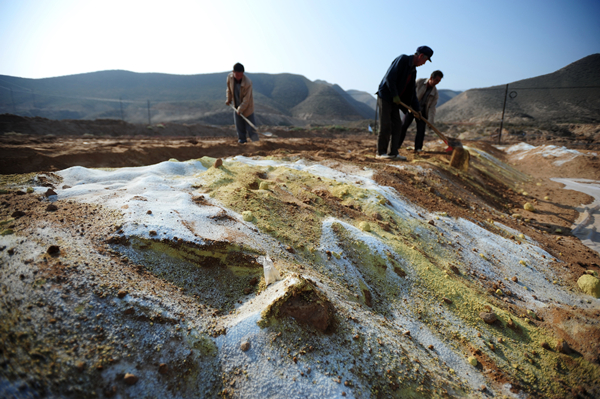Farm pollution: a growing concern
 0 Comment(s)
0 Comment(s) Print
Print E-mail Shanghai Daily, April 15, 2015
E-mail Shanghai Daily, April 15, 2015
Farm pollution in China is worsening, despite moves to reduce the use of fertilizers and pesticides, the country's agricultural ministry said yesterday, as it urged farmers to switch to organic alternatives.
 |
|
Workers bury heavy metal-polluted soil mixed with some kind of chemical reagent into a purification pit in Baiyin City, Gansu Province, on Oct. 16, 2011. [File photo/Xinhua] |
But experts said that achieving the ministry's goal will be difficult without sacrificing food output, a priority in the world's most populous country.
China consumes about a third of global fertilizers, with rapid growth in use in recent years driven largely by higher fruit and vegetable production. China is the world's biggest grower of apples, strawberries, watermelons and a range of vegetables.
Excessive use of chemical fertilizers and pesticides has led to polluted water sources, contamination of soil with heavy metals and high pesticide residues on food, threatening both public health and agricultural productivity.
"Agricultural non-point source pollution is worsening, exacerbating the risk of soil and water pollution," the ministry said in a statement.
Growers apply 550 kilograms of fertilizer to a hectare of fruit trees and 365kg of fertilizer to a hectare of vegetables, said Vice Agriculture Minister Zhang Taolin.
World Bank data showed China used 647.6kg of fertilizer per hectare of arable land in 2012, compared with 131kg in the United States and 124.3kg in Spain.
Pesticide consumption should be cut to 300,000 tons, from the 320,000 tons at present, Zhang said.
Over the past three decades, China's use of chemical fertilizer has grown by an average of 5.2 percent a year, to 59 million tons in 2013, Xinhua news agency said last month.
"There is large space to reduce this growth," Zhang said, reiterating a target announced late last year to halt growth in fertilizer use nationwide by 2020.
"I believe it is absolutely possible to guarantee our food security strategy," he said, adding that farmers should use more organic options.
Qiu Huanguang, a professor at Renmin University, expressed doubt over the plan.
"Soil fertility is declining so it needs fertilizer to maintain it," he said, adding that switching to organic alternatives, such as animal manure, was much more labor-intensive for farmers already facing rising labor costs.
The government also wants to promote the use of waste management systems at livestock farms and to try to reduce pollution from plastic film, promoting biodegradable products as an alternative, Zhang said.
Farmers use 2.5 million tons of sheeting a year to prevent moisture evaporation and for weed control but the plastic is often left in the soil damaging soil, water and animal health.
China is also targeting more efficient irrigation and recycling of straw left after harvesting for use as mulch, animal feed and biomass.






Go to Forum >>0 Comment(s)